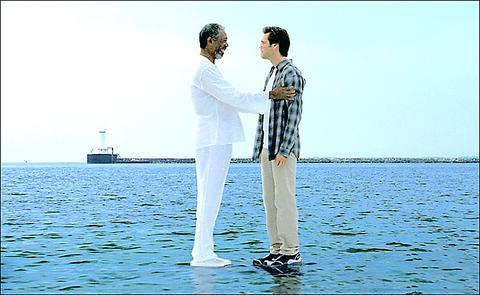Jim Carrey embodies the scary possibility that at heart every human being is a sugar-crazed six-year-old hellion gleefully wreaking havoc in Mommy and Daddy's fastidiously decorated living room.
All this star has to do is stand there and grin to convince you that once the layers of civilization have been peeled away, what's left is an insatiable, rampaging id. And in Carrey's rambunctiously funny new comedy, Bruce Almighty, his alter ego, Bruce Nolan, a frustrated television newscaster in Buffalo relegated to human interest stories, gets to rampage at the loftiest spiritual level.
At Bruce's darkest moment, God (Morgan Freeman) comes to the rescue and summons Bruce by cellphone to the deserted industrial building where God works as a janitor. With an avuncular smirk, he invites Bruce, who has been loudly cursing the heavens, to try his hand at running the universe while God takes a break. Maybe, he chortles, Bruce can do a better job.

PHOTO COURTESY OF BVI
The notion of omnipotence prompts Carrey to go to new adrenaline-crazed comic extremes. As a surrogate deity who impulsively lassos the moon to bring it closer to the earth for a night of romance, he behaves like a hyperkinetic action toy, swiveling and lurching madly from one silly whim to the next. Even more than Jerry Lewis, Robin Williams or Pee-wee Herman, Carrey, now 41 (pretty old for an overgrown kid), sustains a maniacal energy that explodes off the screen in blinding electrical zaps.
Those jolts don't always feel pleasant. Carrey's beaming glare and carnivorous smile convey an undercurrent of bullying insistence that threatens to turn nasty at any moment. (You'd better get with his program, he implies, or else.) And once Bruce is divinely empowered, revenge is high on his list of priorities.
In one of the funniest gags he conjures a monkey that emerges head first from the posterior of a thug who beat him up a couple of days earlier. In another prank he humiliates the rival who beat him out for the job of news anchor by making him babble tongue-twisting nonsense over the air.

PHOTO COURTESY OF BVI
The notion of Carrey as God has theological implications that the filmmakers may not have fully considered. Carrey's infantile Almighty is selfish, capricious and shortsighted, and he delights in cruel practical jokes. It may sound like a sweet idea to lasso the moon and bring it a little closer to your window, but the movie is smart enough to acknowledge that the meteorological implications of such tampering could be catastrophic.
At least until its preachy, goody-goody conclusion, Bruce Almighty, is funnier than either of the two earlier Carrey films (Ace Ventura: Pet Detective and Liar, Liar) directed by Tom Shadyac, who oversaw this latest farce.
It all begins at a promotional event celebrating Buffalo's Biggest Cookie. Sick and tired of being the station's goofy novelty act, Bruce pursues the about-to-be-vacated job of news anchor. The moment he learns he didn't get the position, he is on the air at Niagara Falls, has a public meltdown and is fired. Prowling the city in a funk, Bruce hurls angry accusations at the heavens that are countered when he is summoned for an interview for the job of divine stand-in.

PHOTO COURTESY OF BVI
After affectionately toying with Bruce, God does a couple of casual miracles to prove he's who he says he is, then makes Bruce the offer he can't refuse. Bruce immediately discovers he can walk on water and has the power to send his girlfriend, Grace (Jennifer Aniston), to reeling new peaks of sexual ecstasy. Resuming his television career, he sets his sights on the elusive anchor position and turns himself into a local news star by creating spectacular scoops wherever he happens to be.
But being God, Bruce discovers, can also be a drag. When he begins to hear the muttered prayers of the world, he has no idea how to silence the din. In desperation, he lumps those millions of pleas into e-mail and answers them with a blanket yes. As a result, a lottery has so many winners that the city erupts in riot when it's revealed that each lucky contestant will pocket a measly US$17.
Meanwhile Bruce's love life suffers after an initial rush. As Grace, the loyal girlfriend who runs a day-care center, Aniston brings a likable common-sense realism to a largely thankless role.

Desperate dads meet in car parks to exchange packets; exhausted parents slip it into their kids’ drinks; families wait months for prescriptions buy it “off label.” But is it worth the risk? “The first time I gave him a gummy, I thought, ‘Oh my God, have I killed him?’ He just passed out in front of the TV. That never happens.” Jen remembers giving her son, David, six, melatonin to help him sleep. She got them from a friend, a pediatrician who gave them to her own child. “It was sort of hilarious. She had half a tub of gummies,

June 23 to June 29 After capturing the walled city of Hsinchu on June 22, 1895, the Japanese hoped to quickly push south and seize control of Taiwan’s entire west coast — but their advance was stalled for more than a month. Not only did local Hakka fighters continue to cause them headaches, resistance forces even attempted to retake the city three times. “We had planned to occupy Anping (Tainan) and Takao (Kaohsiung) as soon as possible, but ever since we took Hsinchu, nearby bandits proclaiming to be ‘righteous people’ (義民) have been destroying train tracks and electrical cables, and gathering in villages

The wide-screen spectacle of Formula One gets a gleaming, rip-roaring workout in Joseph Kosinski’s F1, a fine-tuned machine of a movie that, in its most riveting racing scenes, approaches a kind of high-speed splendor. Kosinski, who last endeavored to put moviegoers in the seat of a fighter jet in Top Gun: Maverick, has moved to the open cockpits of Formula One with much the same affection, if not outright need, for speed. A lot of the same team is back. Jerry Bruckheimer produces. Ehren Kruger, a co-writer on Maverick, takes sole credit here. Hans Zimmer, a co-composer previously, supplies the thumping

Swooping low over the banks of a Nile River tributary, an aid flight run by retired American military officers released a stream of food-stuffed sacks over a town emptied by fighting in South Sudan, a country wracked by conflict. Last week’s air drop was the latest in a controversial development — private contracting firms led by former US intelligence officers and military veterans delivering aid to some of the world’s deadliest conflict zones, in operations organized with governments that are combatants in the conflicts. The moves are roiling the global aid community, which warns of a more militarized, politicized and profit-seeking trend